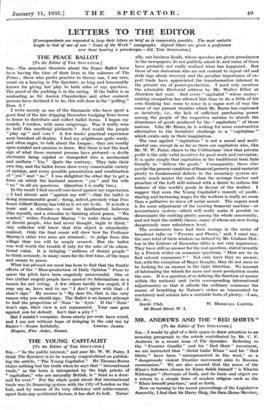LETTERS TO THE EDITOR [Correspondents are requested to keep their
letters as brief as is reasonably possible. The most suitahle length is that of one of our " !stews of the Week" paragraphs. Signed letters are given a preference over those bearing a pseudonym.—Ed. THE SPECTATOR.]
THE PEACE BALLOT
[To the Editor of THE SPECTATOR.) SIR,—The armchair theorists about the Peace Ballot have hen having the time of their lives in the columns of The Times ; those who prefer practice to theory can, I am sure, count on a hearing in The Spectator, so long and honourably known for giving fair play to both sides of any question. The proof of the pudding is in the eating. If the ballot is as misleading as Sir Austen Chamberlain and other eminent persons have declared it to be, this will show in the "polling." Does it ?
I write merely as one of the thousands who have spent a good deal of the late dripping December trudging from house to house to distribute and collect ballot forms. I began my, rounds, I confess, with some misgivings. Was it really wise to hold this unofficial plebiscite ? And would the people "play up " and vote ? A few weeks' practical experience soon banished all doubts. I find my neighbours quite ready, and often eager, to talk about the League ; they are mostly open-minded and anxious to learn. But there is not the least sign of what those eminent persons have pictured—a docile electorate being cajoled or stampeded into a mechanical and uniform " Yes." Quite the contrary. They take their own line, and the ballot forms show every conceivable variety of opinion, and every possible presentation and combination of " yes " and " no." I was delighted the other day to get a form on which the husband answers " yes " and the wife " no " to all six questions. (Question 5 is really two.) In the result I find myself convinced against my expectation
—I had almost said " against my will "—that the ballot is doing immeasurable good ; doing, indeed, precisely what Pro- fessor Gilbert.urray has told us it set out to do. It is both a tonic and a stimulus—a tonic to fainthearted believers (like myself), and a stimulus to thinking about peace. " We wanted," writes Professor Murray " to make those millions of decent people, who had never thought, begin to think." Any collector will know that this object is abundantly realized. Only the final count will show how far Professor Murray's other two aims are attained ; to judge from this village they too will be amply secured. But the ballot was well worth the trouble if only for the sake of its educa- tional value. It is bringing " millions of decent people " to think seriously, in many cases for the first time, of the ways and means to peace.
What has pleased me most has been to find that the frantic
efforts of the " Mass-production of Daily Opinion Press to queer the pitch have been singularly unsuccessful. One or two (rather stupid) people have •quoted its fulminations as a reason for not voting. A few others hardly less stupid, if I may say so, have said to me " I don't agree with that—I shan't sign." My answer is " My dear Sir, that is the very reason why you should sign. The Ballot is an honest attempt to find the proportion of ` Noes ' to Ayes.' If the ` Noes ' won't sign, their view is not represented. Your case goes against you -by default. Isn't that a pity ? " •
But _I mustn't complain. Some ninety per cent. have voted, and I. am not without hope of bringing in the odd ten by Easter !—Yours- faithfully, Licaszt Jarvis. Moyses, Five Ashes, Sussex.






































 Previous page
Previous page